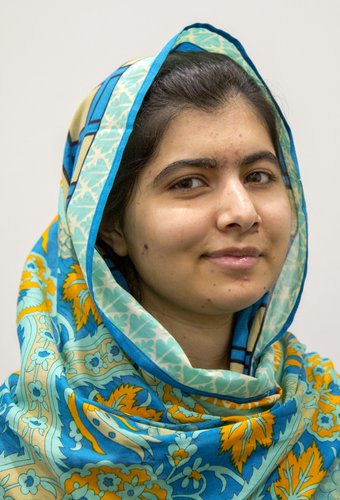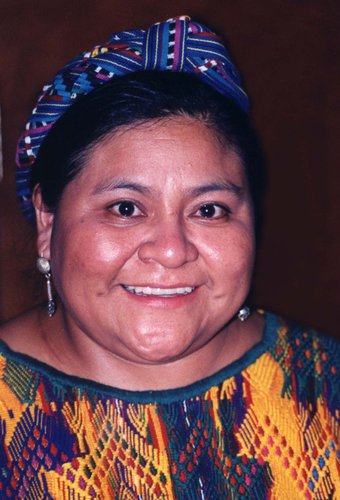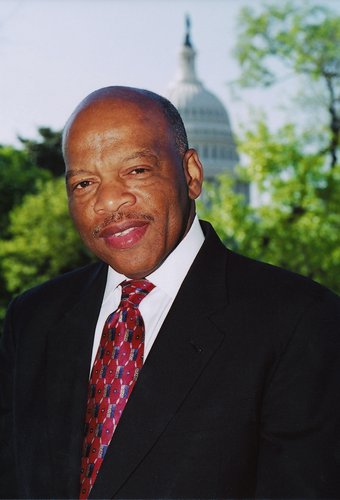
Harvey Milk
Harvey Milk became one of the first openly gay officials in the United States in 1977 when he was elected to the San Francisco Board of Supervisors. At a time when gay people faced rampant discrimination and hostility, Milk represented his community and advocated for not only LGBT rights but also the rights of all minorities and marginalized people.

Martin Luther King Jr.
Martin Luther King Jr. led the American civil rights movement from the mid-1950s until his assassination in 1968. His vision led to important legislation, including the Civil Rights Act of 1964 and the Voting Rights Act of 1965.

Malala Yousafzai
Malala Yousafzai was a 15-year-old activist in 2012, when she was shot in the face by a Taliban militant who objected to girls’ attending school. Since her recovery, Yousafzai has become an influential champion for human rights, peace and education, especially girls’ education.

Dolores Huerta
Dolores Huerta was a labor leader and civil rights activist who cofounded the National Farm Workers Association, along with Cesar Chavez, in 1962 to defend migrant workers’ rights. Together, they led one of the longest agricultural strikes in America.

Nelson Mandela
Nelson Mandela led the historic anti-apartheid movement in South Africa and freed his country from white minority rule. He had spent the previous 27 years of his life in prison, primarily at South Africa’s notorious Robben Island. When he was released in 1990, he received a hero’s welcome and in 1994 was elected as South Africa’s first Black president.

Rigoberta Menchú
Rigoberta Menchú, an indigenous K’iche’Maya was awarded the Nobel Peace Prize for her valiant work as a human rights activist in Guatemala during that country’s civil war. She is widely known today as a leading advocate of indigenous rights and cultural reconciliation throughout the Americas.

Rick Hansen
Rick Hansen is an athlete and disability rights activist who traveled by wheelchair through 34 countries to promote research and rehabilitation.

Liu Xiaobo
Liu Xiaobo was a writer and human rights activist who called for political reforms and campaigned to end communist rule in China. He attended a student protest in Tiananmen Square in 1989 which led to him being arrested. Once out, he continued to criticize China’s communistic rule and called for a more democratic China which led to him being imprisoned once again. Xiaobo would continue between speaking freely and being imprisoned until June 26, 2017 when he was granted medical parole after being diagnosed with liver cancer. Before then, in October of 2010, Xiaobo was granted a Nobel Peace Prize for his non-violent protests.

José Ramos-Horta
José Ramos-Horta is a politician and diplomat who led the East Timorese resistance to Indonesian occupation and promoted a peace plan.

Shirin Ebadi
Shirin Ebadi is a judge and lawyer engaged in fighting for women’s rights who founded the Defenders of Human Rights in Iran.

Susan B. Anthony
Susan B. Anthony was a women’s rights activist who played a pivotal role in the fight for women’s voting rights. She also participated in the abolitionist (antislavery movement) and the temperance movement. She would go on to organize (with the help of close friends/family) the Women’s Loyal National League and the American Equal Rights Association.

Emma González
Emma González is an activist and gun control advocate, who as a student, survived the Marjory Stoneman Douglas High School shooting in 2018.

Marian Wright Edelman
Marian Wright Edelman is advocate for improved childcare and the protection of children who are disabled, homeless, abused or neglected. She founded the Children’s Defense Fund.

Congressman John Lewis
From his membership as a Freedom Rider to the march in Selma to his 33 years serving as a U.S. Representative for Georgia’s 5th Congressional District, Congressman John Lewis dedicated his life to protecting human rights. Though he espoused a non-violent approach, he was arrested more than 40 times yet forgave those that beat and persecuted him along the way.

Dan Savage
Dan Savage is an author and LGBTQ activist who, with his husband, Terry Miller, started the It Gets Better Project to help prevent suicide among LGBTQ youth.

Wangari Maathai
Wangari Maathai created and led the Green Belt Movement, focused on the planting of trees, conservation and women’s rights.

Chief Joseph
Chief Joseph led what is known as the “Nez Perce War” based on his tribe’s name. The war, however, was a retreat in which Chief Joseph attempted to flee to the Canadian border with his tribe to avoid as many casualties from the U.S. army as possible as the U.S. stole indigenous land. Faced with multiple threats of war for defending their land, Chief Joseph made the continuous and conscious effort to be peaceful.

Rosa Parks
Rosa Parks, a civil rights activist, is most known for her pivotal role in the Montgomery Bus Boycott where she refused to give up her seat. Contrary to the popular belief that Parks refused to move because she was “tired” she was actually a member of the National Association for the Advancement of Colored People and the boycott had been planned in advance.

Frederick Douglass
Frederick Douglass, an escaped slave, was an author, speaker, preacher, and a leader of the abolitionist movement who fought to end the practices of slavery. At one point, he would publish an abolitionist newspaper and write a direct letter to his former master. In addition to being an abolitionist, Douglass wholeheartedly supported women’s rights—specifically, their right to vote.

Elie Wiesel
Elie Wiesel was a Holocaust survivor, writer and political activist who campaigned for victims of oppression around the world. His novel, “Night”, Wiesel describes his Holocaust experience. The book has since then gained international attention and has been translated into 30 languages. Wiesel also heavily influenced the creation of the United States Holocaust Memorial Museum which now honors international human rights activist with the “Elie Wiesel Award.”
United Against Human Trafficking
United Against Human Trafficking’s mission is to end human trafficking through preventing exploitation, educating the community, and empowering survivors. They prepare citizens to recognize and address human trafficking situations.
Montrose Center
The Montrose Center and their team of state-licensed clinicians, masters-level therapists, skilled educators, support staff and dedicated volunteers work together to empower the community—primarily lesbian, gay, bisexual, transgender, and queer (LGBTQ) individuals and their families—to live healthier, more fulfilling lives.
T.E.J.A.S.
T.E.J.A.S. is dedicated to providing community members with the tools necessary to create sustainable, environmentally healthy communities by educating individuals on health concerns and implications arising from environmental pollution, empowering individuals with an understanding of applicable environmental laws and regulations and promoting their enforcement, and offering community building skills and resources for effective community action and greater public participation.
Catholic Charities
Catholic Charities helps people in southeast Texas by providing caring, compassionate services and advocating for social justice in collaboration with parishes and communities. For nearly 80 years, Catholic Charities has provided food, clothing, shelter and a network of support services to people of all ages and from all walks of life and religious backgrounds.
Second Servings
Second Servings’ mission is to alleviate hunger and reduce waste in the city by rescuing surplus food from businesses and conducting free same-day delivery to approved charitable meal sites. As the only prepared and perishable food rescue organization in Houston, we are growing exponentially and now reach approximately 175,000 people annually.